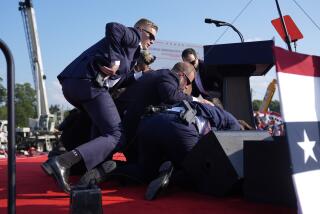Mishaps Set Summit Tone for President
- Share via
PARIS — It’s started off as that sort of summit for President Bush: Not only did the Soviets balk at his Persian Gulf policy, but his limousine sideswiped a palace, the fuses blew in his embassy and the Germans upstaged him at the ceremonies.
Maybe the blown fuse was a bad omen for Bush’s meeting with Soviet President Mikhail S. Gorbachev. The Soviet chief had barely entered the palatial residence of U.S. Ambassador Walter J. P. Curley on the Champs Elysees and sat down for a photo opportunity with Bush on Monday night when, suddenly, there went the lights.
The strain of dozens of television lamps may have been to blame for the outage, but some embassy officials blamed a short-circuit in the kitchen of the huge 19th-Century mansion.
Then there was the car, Bush’s presidential limousine. The armor-plated, specially wired, ultra-sophisticated machine is constructed to withstand virtually any assault or catastrophe--except, apparently, bad driving.
Sunday night, when Bush’s motorcade pulled into the U.S. Embassy, the President’s driver made too tight a turn into the building’s entrance and smashed the door handles on the car’s right side.
The backup limousine, dutifully following the leader, apparently suffered the same fate, Administration officials said.
Now, these are no ordinary door handles. Like everything else on the $600,000 automobile the White House bought last year--one of several presidential limousines the government flies by military transport to carry the President wherever he travels--the door handles are made with security in mind.
They are specially constructed to ensure that if a crowd ever attacked the car, it could not force open the doors.
Because of that, fixing the battered handle was not simply a matter of driving down the Champs Elysees to the neighborhood station de reparations. Instead, the call went out to Federal Express to deliver new door handles across the Atlantic from the United States.
Cars, of course, are a major part of any summit. While the details of documents, declarations and diplomacy may occupy the time of higher-level officials, most of the people who staff a summit--from police to protocol officers--spend their days making sure the world leaders simply get where they need to be.
And get there in correct style. At least most of the time. The French, who are hosting the summit, provided Renault and Peugeot sedans for lesser leaders who did not have their own vehicles flown in. The elegant cars came complete with national flags.
All 36 delegations at the Conference on Security and Cooperation in Europe got one--34 nations, the European Community and the United Nations.
But when the Hungarian delegation showed up at the Elysee Palace for lunch Monday, the flag on its car was flying upside down.
And some delegations apparently found the Renaults insufficient for their needs. In addition to Bush and Gorbachev, who both brought their own custom limos to Paris, and British Prime Minister Margaret Thatcher, who brought a Rolls-Royce across the English Channel, the delegation from Liechtenstein showed up driving a Jaguar.
Getting there on time is also a major issue. Protocol demands that officials arrive at events in a certain order. At the ceremony Monday morning to sign the treaty limiting conventional arms in Europe, protocol dictated that heads of government--prime ministers and the like--should arrive first, followed by heads of state--presidents and such.
That gave Bush the right to arrive last, the most desired spot because the last person gets to keep everyone else waiting and perhaps get the most media attention.
Things didn’t work out that way for him, though.
When he arrived, accompanied by his top aides and Sen. Claiborne Pell (D-R.I.), the chairman of the Senate Foreign Relations Committee--political protocol matters, too--all the leaders were there but one.
Germany’s Chancellor Helmut Kohl showed up late. Some European leaders have been complaining about the new assertiveness of German officials ever since the unification of the formerly divided East and West. But German officials insisted that Kohl’s tardiness was the result of an innocent problem: His motorcade got stuck in traffic, they said.
In the afternoon, when time came to arrive for lunch at the Elysee Palace, the seat of France’s presidency, Kohl made up for his morning tardiness by arriving first.
But as the official greeter, French protocol chief Andre Gadaud, stepped out to shake his hand, Kohl, who is running for reelection as chancellor, spied a German television crew. Turning his back on Gadaud, he made a beeline for the cameras, holding a quick press conference while palace functionaries, decked out in dark blue tail coats, vermilion vests, white tie and gloves, milled around looking nervous.
After a few minutes, Kohl finished his photo opportunity and said hello to his greeters. About 45 minutes and 34 greetings later, Bush arrived. The new door handles worked, and he stepped out onto the palace’s gravel courtyard.
“I’m the last?” he asked Gadaud.
“You’re the last,” Gadaud confirmed.
More to Read
Get the L.A. Times Politics newsletter
Deeply reported insights into legislation, politics and policy from Sacramento, Washington and beyond. In your inbox twice per week.
You may occasionally receive promotional content from the Los Angeles Times.











